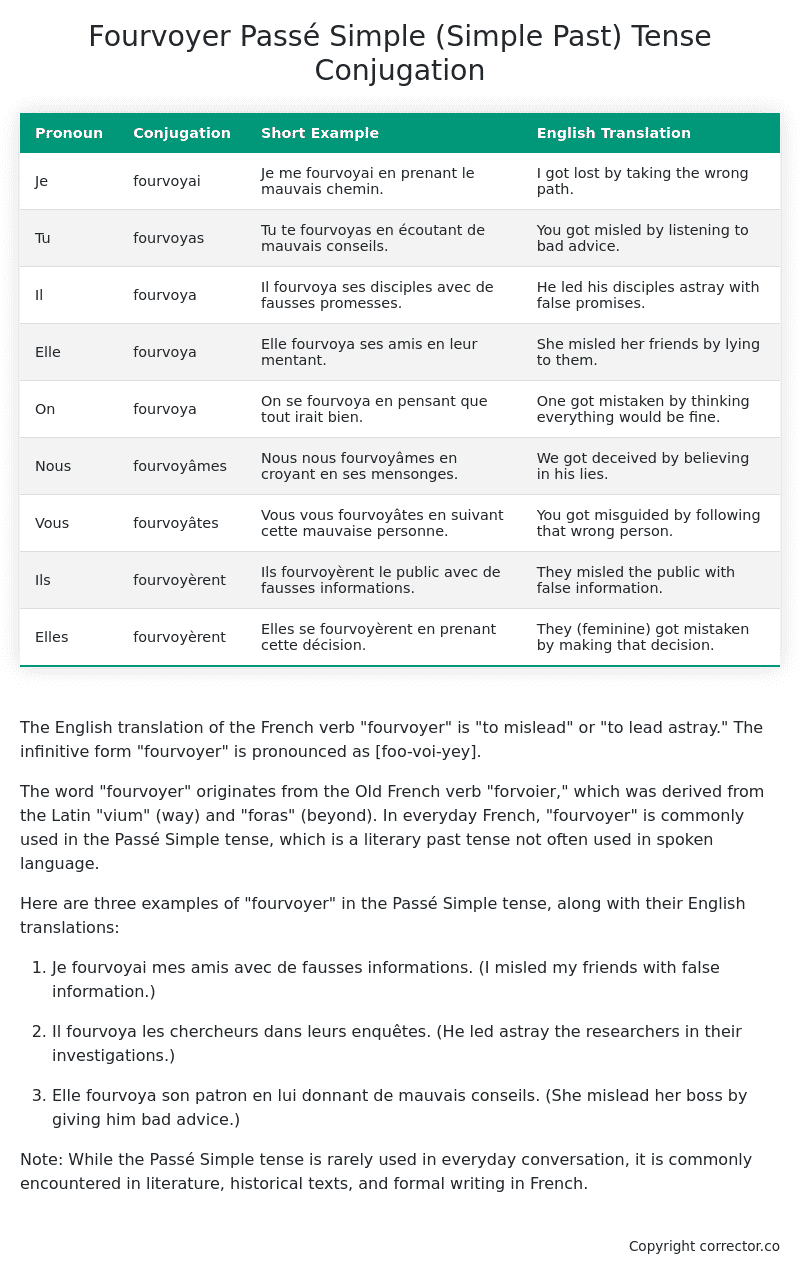Passé Simple (Simple Past) Tense Conjugation of the French Verb fourvoyer
Introduction to the verb fourvoyer
The English translation of the French verb “fourvoyer” is “to mislead” or “to lead astray.” The infinitive form “fourvoyer” is pronounced as [foo-voi-yey].
The word “fourvoyer” originates from the Old French verb “forvoier,” which was derived from the Latin “vium” (way) and “foras” (beyond). In everyday French, “fourvoyer” is commonly used in the Passé Simple tense, which is a literary past tense not often used in spoken language.
Here are three examples of “fourvoyer” in the Passé Simple tense, along with their English translations:
-
Je fourvoyai mes amis avec de fausses informations.
(I misled my friends with false information.) -
Il fourvoya les chercheurs dans leurs enquêtes.
(He led astray the researchers in their investigations.) -
Elle fourvoya son patron en lui donnant de mauvais conseils.
(She mislead her boss by giving him bad advice.)
Note: While the Passé Simple tense is rarely used in everyday conversation, it is commonly encountered in literature, historical texts, and formal writing in French.
Table of the Passé Simple (Simple Past) Tense Conjugation of fourvoyer
| Pronoun | Conjugation | Short Example | English Translation |
|---|---|---|---|
| Je | fourvoyai | Je me fourvoyai en prenant le mauvais chemin. | I got lost by taking the wrong path. |
| Tu | fourvoyas | Tu te fourvoyas en écoutant de mauvais conseils. | You got misled by listening to bad advice. |
| Il | fourvoya | Il fourvoya ses disciples avec de fausses promesses. | He led his disciples astray with false promises. |
| Elle | fourvoya | Elle fourvoya ses amis en leur mentant. | She misled her friends by lying to them. |
| On | fourvoya | On se fourvoya en pensant que tout irait bien. | One got mistaken by thinking everything would be fine. |
| Nous | fourvoyâmes | Nous nous fourvoyâmes en croyant en ses mensonges. | We got deceived by believing in his lies. |
| Vous | fourvoyâtes | Vous vous fourvoyâtes en suivant cette mauvaise personne. | You got misguided by following that wrong person. |
| Ils | fourvoyèrent | Ils fourvoyèrent le public avec de fausses informations. | They misled the public with false information. |
| Elles | fourvoyèrent | Elles se fourvoyèrent en prenant cette décision. | They (feminine) got mistaken by making that decision. |
Other Conjugations for Fourvoyer.
Le Present (Present Tense) Conjugation of the French Verb fourvoyer
Imparfait (Imperfect) Tense Conjugation of the French Verb fourvoyer
Passé Simple (Simple Past) Tense Conjugation of the French Verb fourvoyer (You’re reading it right now!)
Passé Composé (Present Perfect) Tense Conjugation of the French Verb fourvoyer
Futur Simple (Simple Future) Tense Conjugation of the French Verb fourvoyer
Futur Proche (Near Future) Tense Conjugation of the French Verb fourvoyer
Plus-que-parfait (Pluperfect) Tense Conjugation of the French Verb fourvoyer
Passé Antérieur (Past Anterior) Tense Conjugation of the French Verb fourvoyer
Futur Antérieur (Future Anterior) Tense Conjugation of the French Verb fourvoyer
Subjonctif Présent (Subjunctive Present) Tense Conjugation of the French Verb fourvoyer
Subjonctif Passé (Subjunctive Past) Tense Conjugation of the French Verb fourvoyer
Subjonctif Imparfait (Subjunctive Imperfect) Tense Conjugation of the French Verb fourvoyer
Subjonctif Plus-que-parfait (Subjunctive Pluperfect) Tense Conjugation of the French Verb fourvoyer
Conditionnel Présent (Conditional Present) Tense Conjugation of the French Verb fourvoyer
Conditionnel Passé (Conditional Past) Tense Conjugation of the French Verb fourvoyer
Conditionnel Passé II (Conditional Past II) Tense Conjugation of the French Verb fourvoyer
L’impératif Présent (Imperative Present) Tense Conjugation of the French Verb fourvoyer
L’impératif Passé (Imperative Past) Tense Conjugation of the French Verb fourvoyer
L’infinitif Présent (Infinitive Present) Tense Conjugation of the French Verb fourvoyer
L’infinitif Passé (Infinitive Past) Tense Conjugation of the French Verb fourvoyer
Le Participe Présent (Present Participle) Tense Conjugation of the French Verb fourvoyer
Le Participe Passé (Past Participle) Tense Conjugation of the French Verb fourvoyer
Struggling with French verbs or the language in general? Why not use our free French Grammar Checker – no registration required!
Get a FREE Download Study Sheet of this Conjugation 🔥
Simply right click the image below, click “save image” and get your free reference for the fourvoyer Passé Simple tense conjugation!

Fourvoyer – About the French Passé Simple (Simple Past) Tense
Formation
Usage
Narration
Historical Context
Interactions with other tenses
Passé Composé
Imparfait
Conditional and Subjunctive
Summary
I hope you enjoyed this article on the verb fourvoyer. Still in a learning mood? Check out another TOTALLY random French verb conjugation!


